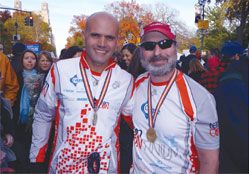Marathon effort to support cancer care
Oncologist Howard Hochster, MD, professor of medicine at New York University Cancer Institute, ran the 2008 New York City Marathon to benefit Team Continuum which provides immediate nonmedical support and assistance to cancer patients and their families.

Oncologist Howard Hochster, MD, professor of medicine at New York University Cancer Institute, ran the 2008 New York City Marathon to benefit Team Continuum which provides immediate nonmedical support and assistance to cancer patients and their families. Dr. Hochster (right) is pictured with fellow runner Geraldo Rivera (not the TV personality). Mr. Rivera’s 11-year-old daughter is a brain cancer patient and a Team Continuum grant recipient. Dr. Hochster and Mr. Rivera were among 400 runners supporting Team Continuum. The non-profit organization raised more than $5.5 million last year to fund their cancer care and support efforts.
The organization is currently enrolling runners for the April 20, 2009, Boston marathon. For more information, go to www.teamcontinuum.net.